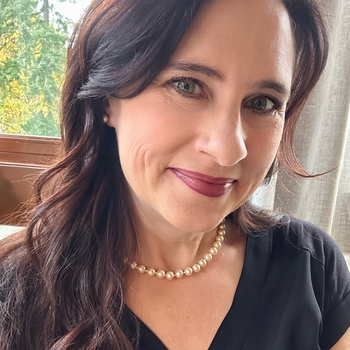
Michelle Schuyleman, MA, LMHC, CMHS, MHP
Introduction
I'm not able to accept any new clients at this time (last updated 11-11-24) I began working in the mental health field in 2000 and earned my master’s degree in counseling psychology from Chapman University in 2003. The next six years were spent working in a variety of settings, including non profits, child welfare, crisis response, community mental health, and in hospice as a therapist and program coordinator. In 2012, I earned a certification as a Children’s Mental Health Specialist (CMHS). I have had a small private practice since 2009 and then expanded to full-time private practice in 2016. I always knew I wanted to be a therapist. When I was in elementary school, my mom took me to a therapist because she was worried about how I was adjusting to several big changes in our family. I don’t recall much of what we talked about, but I remember feeling safe and looking forward to appointments. I saw that therapist off and on for a couple years, and I have fond memories of my time with her. During my junior year in high school, I needed more support than my friends and family could provide, so I sought out therapy again, but with a different therapist. That therapist and that time in my life was transformational. The work we did sent my life on a different trajectory than could have been. I still use his helpful quotes and visual images to this day. In therapy, I learned valuable skills, improved my self confidence, learned about healthy boundaries, and most importantly, learned how to manage anxiety and depression so I could achieve my goals. TREATMENT OPTIONS These are the evidence based modalities I’m equipped to provide as a professional counselor. Eye Movement Desensitization and Reprocessing (EMDR) EMDR is an evidence based structured therapy that encourages the client to briefly focus on the trauma memory while simultaneously experiencing bilateral stimulation (typically eye movements), which is associated with a reduction in the vividness and emotion associated with the trauma memories. Accelerated Resolution Therapy (ART) ART is an evidence based form of eye movement therapy that can provide quick, effective, and long term relief for anxiety, depression, PTSD, OCD, substance use, eating disorders, and phobias. Clients often feel relief in as little as one ART session. Cognitive Processing Therapy (CPT) This model allows clients to identify areas of thinking that are "Stuckpoints" in their mental narrative. By learning to first identify and then challenge these thoughts, clients develop skills in managing cognition and emotion. CPT can be effective for treating anxiety, depression, and trauma. Dialectical Behavioral Therapy (DBT) DBT is an effective form of therapy for those who struggle with emotional regulation, finding and maintaining healthy relationships, impulsive and self harming behavior, and catastrophic thinking or reactions. Its main goals are to teach people how to live in the moment, develop healthy ways to cope with stress, regulate their emotions, and improve their relationships with others. Cognitive Behavioral Therapy (CBT) CBT helps clients understand how thoughts (negative or self defeating, irrational, fear-based), translate into feelings, and then impact the way we behave, make decisions, engage in life, function in relationships, and/or how we treat ourselves. CBT Is commonly used to treat anxiety and depression. Additional completed trainings: Trauma Focused Cognitive Behavioral Therapy (TF-CBT) Suicide and Self Harm Professional Law and Ethics White Supremacist Violence: Clinically Understanding the Resurgence and Stopping the Spread Lifting Black Voices: Therapy, Trust, and Racial Trauma Acceptance & Commitment Therapy for Substance Abuse, Eating Disorders, Anxiety, Depression, Self-Injury, PTSD, and Psychosis (ACT) Professional Affiliations Wild Grief Board Member (2016 to current) Wild Grief Board Vice President (2021-2022) Wild Grief Board President (2022-2023) International Society of Accelerated Resolution Therapy (2023 to current) What to expect During our first few sessions, we'll get to know each other, make sure we're a good fit, and decide on some goals for working together. After that, I check in regularly to make sure you feel heard and that we're working on issues that are important to you. Some people know exactly what they want to address in therapy. Others know they need help, but don't quite know how to get started. That's ok! We will work together to create a plan that puts you on a path towards healing and wellness. GOOD FAITH ESTIMATE NOTICE You have the right to receive a “Good Faith Estimate” explaining how much your medical and mental health care will cost. Under the law, health care providers need to give patients who don’t have insurance or who are not using insurance an estimate of the expected charges for medical services, including psychotherapy services. You have the right to receive a Good Faith Estimate for the total expected cost of any non- emergency healthcare services, including psychotherapy services. You can ask your health care provider, and any other provider you choose, for a Good Faith Estimate before you schedule a service. If you receive a bill that is at least $400 more than your Good Faith Estimate, you can dispute the bill. Make sure to save a copy or picture of your Good Faith Estimate. For questions or more information about your right to a Good Faith Estimate, visit www.cms.gov/nosurprises or call (800) 985-3059
Connect
View websiteHighlights
- Accepts insurance
Specialties
Additional focus areas
Treatment Approaches
Population focus
Languages
-
English
Pay with insurance
-
Aetna
-
Anthem
-
BlueCross and BlueShield
-
Kaiser Permanente
-
First Choice Health
-
Providence Behavioral Health